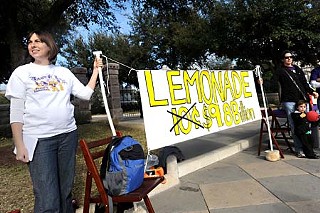AISD: Long on Ideas ... Short on Funds
AISD looks for answers to budget dilemma
By Richard Whittaker, Fri., Jan. 28, 2011

The Austin Independent School District's plans to deal with its spiraling budget crisis may include declaring financial exigency and massive layoffs – but just when the district most needs community support, it's busy trying to rebuild bridges burnt over threats to close schools.
Since an initial proposal to mothball or repurpose up to nine schools sparked public outrage Jan. 10, the district's Facility Master Plan Task Force has changed direction. With the popular perception brewing that their job was to close campuses, members have been asked to refocus on their original assignment: to create a data-driven 10-year strategy for what buildings and equipment the district will need in order to reach its educational targets. The other part of their task has become calming the firestorm of criticism over concentrating on closures. Task force co-Chair Janet Mitchell told her colleagues this week, "By only showing one option, we didn't show how objective we tried to be."
Parents at the nine campuses on the draft closure list have banded together, and on Jan. 24 they announced the formation of the Coalition To Save Austin Urban Schools. "We just thought there would be strength in numbers," said coalition spokesman Sam Lee, "and we have very similar reasons for keeping these schools open." He added that while parents understand the budget crisis, they have a simple message for the district: "Don't make short-term cuts that will affect us for decades to come."
The task force had already taken that message to heart. At its Jan. 18 meeting, members mulled a list of alternatives to school closures, including selling the Carruth Administration Center, converting one middle school into a kindergarten-through-eighth-grade center, and repurposing Dobie Middle as an elementary. Yet these stark proposals simply form a subplot in the bigger tragedy that is the draft budget. At the meeting, members were working under the assumption of a $54 million shortfall. On Jan. 21, Education Austin co-President Rae Nwosu was told by district staff to expect $74 million. By Saturday, Jan. 22, when Superintendent Meria Carstarphen summoned the task force for what she called "a debriefing session," it had risen to $113 million. To help tackle that daunting number, Carstarphen has stepped up the group's agenda; rather than identifying $5 million in savings for the 2012-13 school year, she asked that they find $3.5 million by this fall.
Any cuts, of course, will be driven by the pending state budget. The starting numbers there are grim. Rather than adding $10 billion dollars for inflation and population growth, the first draft from the House slashes $1 billion from the Foundation Schools Program and $2 billion from Texas Education Agency discretionary grants. At their Jan. 24 board meeting, trustees responded to these numbers by approving new staffing formulas that would cut 485 full-time positions, including teachers and principals. Nwosu said she hoped positions could be eliminated without firings, but there will inevitably be fewer employees and no vacant positions for new teachers. She warned that sweeping program cuts and worsening staff-pupil ratios devastate the Legislature's commitment to college readiness for all children, while also stripping funds from teacher-pay incentive programs that AISD pioneered and lawmakers championed. "They're going back on their philosophy," she said.
So far, the Greater Austin Chamber of Commerce has publicly remained hands-off in this debate. Traditionally, it has paid close attention to district finances. With the landscape shifting, Drew Scheberle, vice president for education and talent development, said he's in "information-gathering mode." He added that the chamber has faith in AISD Chief Financial Officer Nicole Conley-Abrams as someone who "has done a great job on creating a performance-based, program-based budget."
With the enormity of the potential cuts sinking in, some radical ideas for raising money have been raised – such as moving cash from bond payments to maintenance or asking the city of Austin for assistance. However, Texas' strict laws about allocating tax dollars for specific purposes and agencies likely make both options impossible. On another tack, Carstarphen has floated the notion of soliciting state contributions to be used toward the upkeep of the 135-year-old Pease Elementary as a historic site. Considering that the draft budget slashes the Texas Historical Commission's biennial budget from $105 million to just $24 million, the THC is barely treading water itself.
The one untouched area is the idea of a property tax rollback election. The AISD trustees balked at a five-cent raise last fall, and board Vice President Vince Torres argued it would be just as hard to make the case now, especially since Texas' "Robin Hood" recapture rules would mean almost half of any extra cash raised would go to the state. Instead of seeking new tax revenue, he argued, the board will almost inevitably declare financial exigency, allowing the district to make staff cuts even faster. "The next four months," he acknowledged, "are going to be ugly, ugly, ugly."
Nwosu's co-President Ken Zarifis argued that the district lacked foresight on property taxes, and Education Austin will be pushing for the district to bring an increase before voters soon. Had they done this in November, he said, "We could have had at least $15 million dollars coming in this year." As for the Robin Hood rule, he countered that trustees need to shift the argument. If Austinites voted to both increase local funding and send more assistance to other struggling districts, he said, it would be a clear message: "We want our education, even if the state doesn't."
Got something to say on the subject? Send a letter to the editor.










